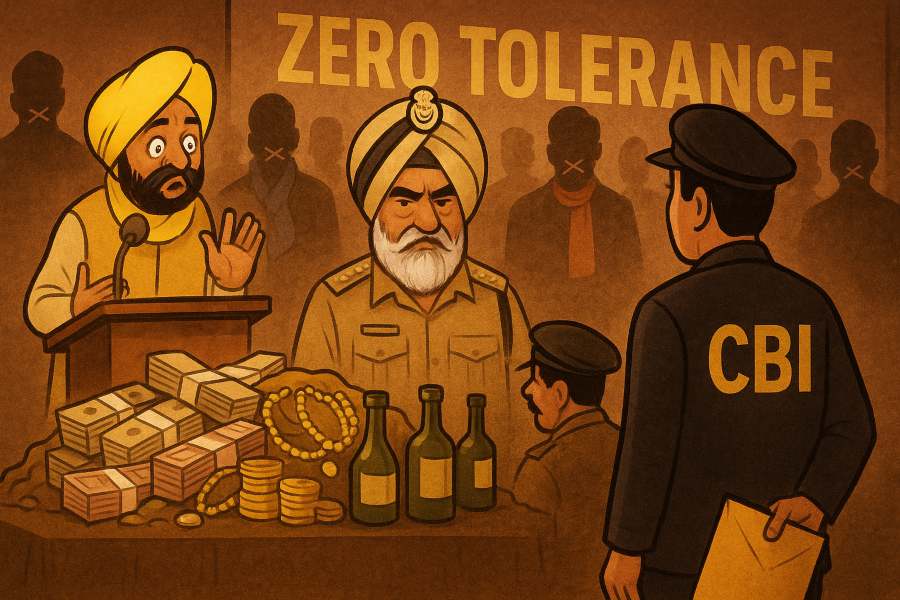“झूठों ने झूठों से कहा है — सच बोलो,
सरकारी एलान हुआ है — सच बोलो,
घर के अंदर तो झूठों की एक मंडी है,
दरवाज़े पर लिखा हुआ है — सच बोलो।”
“Jhooton ne jhooton se kaha hai — sach bolo,
Sarkari elaan hua hai — sach bolo,
Ghar ke andar to jhooton ki ek mandi hai,
Darwaze par likha hua hai — sach bolo.”
– Rahat Indori
THERE COMES A time in every state’s story when silence begins to speak louder than slogans. Punjab has reached that point — a place where corruption no longer shocks, it merely circulates.
![]() Where every scandal feels like a rerun, and every promise of reform like an old headline pasted on new posters.
Where every scandal feels like a rerun, and every promise of reform like an old headline pasted on new posters.
Honesty, once the anthem of politics here, has been auctioned at the marketplace of convenience. The guardians of morality now dine with the accused; the crusaders of change now guard the gates of privilege. Truth, in today’s Punjab, is not dead — it’s simply unemployed. And in this theatre of moral fatigue, even exposure struggles to raise an eyebrow.
In Punjab, corruption doesn’t die — it just changes uniform.
When Cash Spoke Louder Than the State

DIG Harcharan Singh Bhullar
When the Central Bureau of Investigation (CBI) raided Punjab Police DIG Harcharan Singh Bhullar, it didn’t just unearth bundles of cash — it ripped open the conscience of a system long immune to shame.
The CBI’s searches yielded ₹7.5 crore in cash, 2.5 kilograms of gold jewellery, 26 luxury watches, over 100 bottles of imported liquor, firearms, and documents for more than 50 properties.
For an officer who had declared only eight immovable assets worth about ₹14 crore, the arithmetic itself was a confession.

Cash recovered by the CBI from premises linked to Punjab Police DIG Harcharan Bhullar.
The visuals were enough to stun even a scandal-fatigued public — currency heaps, gold glinting under white forensic light, files thicker than trust.
And yet, the noise ended right where it should have begun — in the political corridors of power.
What followed wasn’t outrage. It was absence — a silence so orchestrated it almost sounded rehearsed.
How the Trap Was Sprung
The story began not with a high-profile probe but a scrap dealer’s complaint in Fatehgarh Sahib. He alleged the DIG had demanded ₹8 lakh to “settle” a case.

Krishanu Sharda
Enter Krishanu Sharda, better known as Agent Krishna, Bhullar’s alleged conduit — the man who carried the cash and the risk.
The CBI laid a classic trap in Chandigarh’s Sector 21. Cameras rolled, agents waited, and Krishna was caught red-handed with ₹8 lakh in hand. A follow-up call reportedly captured Bhullar acknowledging the deal.
Within hours, raids fanned out across Chandigarh, Mohali and Samrala, unearthing the treasure trove that would shame a state.
Bhullar was sent to judicial custody, not remand. It wasn’t leniency; it was confidence — the agency already held enough to tighten the noose later.
And yet, as Punjab watched, its loudest voices went mute.
Zero Tolerance, Now Zero Words
The Aam Aadmi Party government, once so noisy about imaandari, has suddenly discovered the benefits of chup.
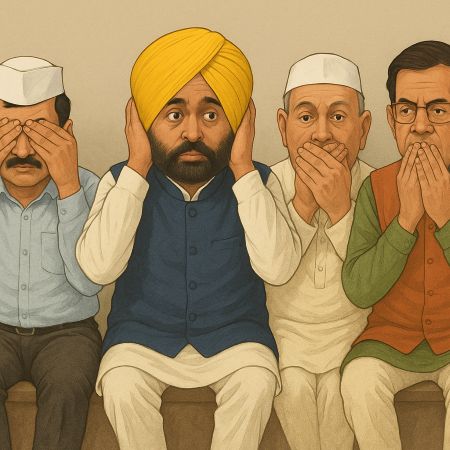
Silence as strategy — AAP leadership maintains composure and distance as the Bhullar storm unfolds.
AAP Leaders Silence — No statement from the Chief Minister’s Office, no sermon from Arvind Kejriwal and Manish Sisodia no tweet from Raghav Chadha.
Even Bhagwant Mann, who once turned corruption into punchlines, seems to have lost his script.
Has Badlav now become Backslide?
The party that spent crores on “Zero Tolerance” ads now spends silence when the scam wears a uniform.
When a clerk is caught taking ₹500, the Vigilance Bureau celebrates on camera; when a DIG is caught with crores, the government’s spine bends.
Opposition’s Silence: United by Complicity
If the ruling benches looked uneasy, the Opposition looked paralysed — stunned not by shock, but by familiarity.
For five long days, neither Congress nor the Shiromani Akali Dal spoke.
It wasn’t relief; it was recognition.
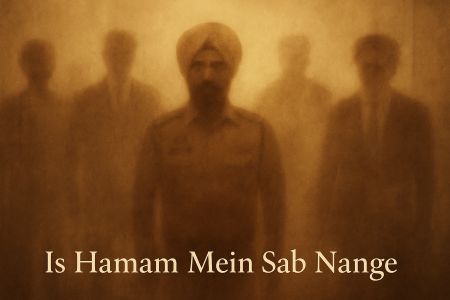
Is Hamam Mein Sab Nange — when moral pretence dissolves in the fog of complicity.
The same capable civil and valiant police officers now under the CBI’s lens had served earlier regimes with equal loyalty. They know the files, the secrets, and the unwritten lines not to cross.
So when one of their own falls, politicians don’t protest — they pause.
No wonder Sukhpal Khaira broke silence only after public outrage peaked, and Sukhbir Badal followed with a sentence barely qualifying as condemnation.
When politics and bureaucracy become Siamese twins, even outrage needs clearance.
In Punjab’s corridors of power, silence is the new loyalty — and “sab nange hain is hamam mein.”
SAFEDPOSH and Self-Proclaimed IMAANDAR
“Power tends to corrupt, and absolute power corrupts absolutely.” — Lord Acton
The white-collared elite of Punjab’s ruling dispensation — the same faces who once shouted Inquilab Zindabad — now ride lifts to higher offices and deeper pockets.
When Bhagwant Mann took oath at Khatkar Kalan to the chants of “Inquilab Zindabad”,
Punjab believed it was witnessing a revolution of integrity — a pledge now tested by silence.
Most AAP ministers and MLAs began with modest means. Yet today, Punjab’s political bazaar buzzes with tales of kabza, commissions and moral trepidation — all floating unchecked through public discourse.
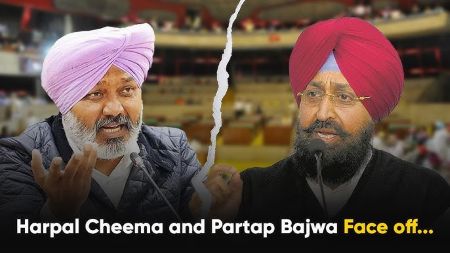
In the Punjab Vidhan Sabha, Leader of Opposition Partap Singh Bajwa alleged Finance Minister Harpal Singh Cheema was receiving ₹35–40 crore monthly from distilleries — a charge he denied, never investigated.
No reaction from Delhi’s “kattar imaandar” high command; no suo motu inquiry. Only strategic silence — the kind that buys time, not truth.
Punjab’s chatter knows these stories well — ministers with new farmhouses, relatives turned property dealers, and whispers of offshore investments from Dubai to Toronto.
If the CBI digs deeper, the fallout may rise straight to the top. Because when the façade of imaandari cracks, what spills out is familiar rot — the safedposh disguised as saviours.
Justice for the Poor, Silence for the Powerful
In Punjab today, justice travels in opposite directions depending on the address.
 Under banners of “Yudh Nashe Virudh,” police parties storm the homes of labourers and small traders, rummaging through utensils and grain tins, posing with a handful of tablets for cameras.
Under banners of “Yudh Nashe Virudh,” police parties storm the homes of labourers and small traders, rummaging through utensils and grain tins, posing with a handful of tablets for cameras.
Yet when their own senior officer’s residence yields hundreds of bottles of imported liquor, they enter in slippers and speak in whispers.
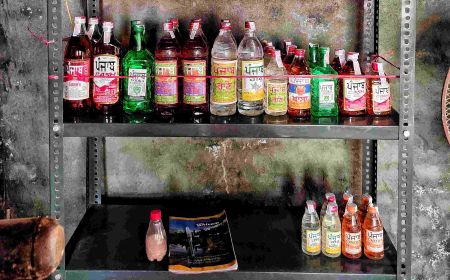
Illicit Liquor
I remember one instance when Patiala Police stormed the shanties of Dhakka Colony. Twenty-one teams raided dozens of homes and proudly claimed to have seized 21 bottles of illicit liquor — one bottle per team. A single team, however, could have unearthed more by stepping into a senior officer’s drawing room.
Today, a single CBI team unearths hundreds of imported bottles — not illicit, of course, just exclusive — from one officer’s house. The irony needs no commentary.
The same police that drags a daily-wager from his jhuggi on suspicion of selling contraband turns deferential at a DIG’s gate.
Bulldozers move swiftly through slums and bazaars, but lose direction when the road curves toward a bungalow or farmhouse.

The bulldozer of reform halts neatly at the compound wall of privilege.
For years, Punjab has watched this double theatre — poor addicts paraded before TV crews while officials caught with wealth, weapons or drug links melt into comfort.
The war on drugs, it seems, spares those who can afford their own rehabilitation.
This selective morality has become Punjab’s signature: one law for the helpless, another for the powerful.
Justice is swift when it’s a poor man’s encroachment and sluggish when it’s a rich man’s loot.
The bulldozer of reform halts neatly at the compound wall of privilege.
Vigilance or Vindictiveness?
Punjab’s Vigilance Bureau and Intelligence Wing — once touted as the state’s eyes and ears — now resemble white elephants feeding on public money. Their purpose shifts with politics: vigilance to protect friends, intelligence to shadow foes.
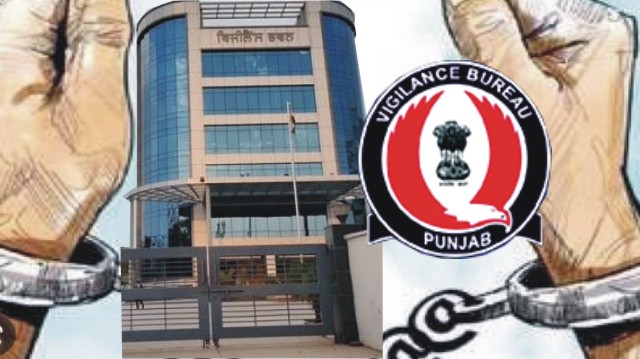
Vigilance Bureau
It’s an open secret that officers once accused of graft or misconduct often find new berths in the Vigilance Bureau itself. The irony is pungent enough to choke accountability — the watchers are the watched, the suspects become investigators.
Intelligence, meanwhile, is used less to sniff corruption and more to trail dissenters — editors, activists, citizens who dare to hold up a mirror to power. Files move faster when they concern political opponents; they stagnate when they concern the government’s own.
When institutions built for scrutiny become instruments of survival, corruption no longer hides — it governs.
Silence as Policy
The Bhullar affair is more than a single scandal; it’s a manual on how a system insulates itself.
The government stays quiet, the Opposition looks away, the bureaucrats circle wagons, and the police fraternity closes ranks. Silence has become Punjab’s most potent policy — the safest shield against accountability.
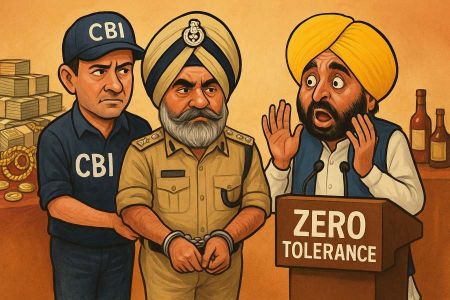
The investigation that spoke louder than the government.
Punjab now faces a moral crossroad: either prove that Zero Tolerance still means something, or admit that Zero Words has become official doctrine.
The CBI’s findings have peeled off the first layer; whether anyone dares to lift the next will decide if Punjab can still reclaim its soul.
Because when power corrupts and conscience sleeps, even the cleanest uniform turns black.
And through that darkness one truth still echoes — Honour without conscience is hollow.
In a state where the powerful wear virtue as costume, Rahat Indori’s words sting truer than ever — ‘Darwaze par likha hua hai, sach bolo.’ But behind that door, truth still waits for permission to enter. ![]()
_________
Also Read:
AAP Rule: Festival Ads Divided by Geography
Disclaimer : PunjabTodayNews.com and other platforms of the Punjab Today group strive to include views and opinions from across the entire spectrum, but by no means do we agree with everything we publish. Our efforts and editorial choices consistently underscore our authors’ right to the freedom of speech. However, it should be clear to all readers that individual authors are responsible for the information, ideas or opinions in their articles, and very often, these do not reflect the views of PunjabTodayNews.com or other platforms of the group. Punjab Today does not assume any responsibility or liability for the views of authors whose work appears here.
Punjab Today believes in serious, engaging, narrative journalism at a time when mainstream media houses seem to have given up on long-form writing and news television has blurred or altogether erased the lines between news and slapstick entertainment. We at Punjab Today believe that readers such as yourself appreciate cerebral journalism, and would like you to hold us against the best international industry standards. Brickbats are welcome even more than bouquets, though an occasional pat on the back is always encouraging. Good journalism can be a lifeline in these uncertain times worldwide. You can support us in myriad ways. To begin with, by spreading word about us and forwarding this reportage. Stay engaged.
— Team PT
